Influential Aboriginal Artists in Australian Art
Australian Aboriginal art is a window into one of the world's oldest continuous cultural traditions, offering vibrant narratives, profound spiritual insights, and a deep connection to the land that sustains life. Aboriginal artists, through their diverse and dynamic practices, not only share stories from the Dreamtime but also navigate the complexities of contemporary Indigenous identity, colonial history, and cultural preservation. Their art transcends mere aesthetic appeal, embodying layers of meaning, tradition, and resistance, thus serving as a vital medium for education, dialogue, and reconciliation.
The following list introduces 25 famous Aboriginal artists, whose works have significantly contributed to both Australian and international art scenes. These artists, with their unique voices and innovative techniques, bridge the gap between the ancient and the modern, the spiritual and the political. From the pioneering watercolours of Albert Namatjira to the groundbreaking contemporary practices of artists like Tracey Moffatt and Richard Bell, this selection showcases the rich diversity and profound depth of Aboriginal art.
These 25 artists are a cross section of many artists all contributing to a broader understanding and appreciation of one of the oldest art traditions in the world; they are storytellers, cultural warriors, and visionary leaders, each playing a pivotal role in the ongoing journey of their communities towards recognition, respect, and empowerment.
Above Image: The Men's Painting Shed in Papunya, 1972
-
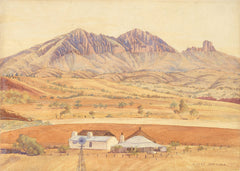
Albert Namatjira pioneered the Indigenous art movement with his watercolour landscapes, blending traditional themes with a Western art form, opening a dialogue between two cultures and challenging perceptions of Aboriginal art.
-
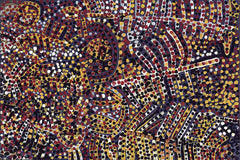
Emily Kame Kngwarreye, with her explosive use of colour and form, brought the depth of her cultural heritage to the forefront of the international art scene, emphasising the continuity and dynamism of Indigenous traditions.
-
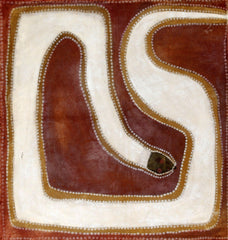
Rover Thomas is celebrated for his role in developing the East Kimberley painting style, using natural pigments to create abstracted landscapes imbued with spiritual significance.
-

Fiona Foley delves into the complex narratives of Indigenous identity, history, and cultural dislocation, utilising a variety of mediums to explore and critique the impacts of colonialism.
-
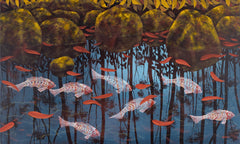
Lin Onus bridged cultures through his art, integrating Indigenous motifs with contemporary themes, thereby crafting a visual language that speaks to a shared Australian identity.
-
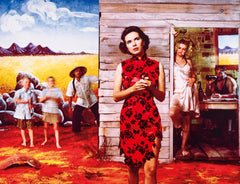
Tracey Moffatt is known internationally for her powerful photographs and films, which dissect issues of race, gender, and identity through a lens that is at once provocative, humorous, and deeply insightful.
-
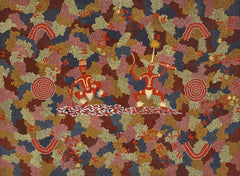
Clifford Possum Tjapaltjarri played a crucial role in the Aboriginal art movement with his dot paintings, transforming traditional sand and body art into canvases that narrate ancestral Dreamtime stories.
-
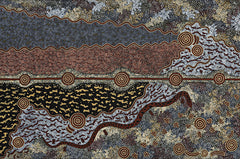
Michael Jagamara Nelson AM reimagined traditional Papunya Tula painting styles in a contemporary context, merging ancient symbols with modern art practices to tell the stories of his land and people.
-

Noŋgirrŋa Marawili dynamically fuses traditional Yolŋu iconography and innovative contemporary artistic expression, capturing the spiritual essence of her homeland in Arnhem Land.
-
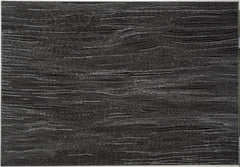
Dorothy Napangardi captured the stark beauty of her desert country, using a monochromatic palette to create intricate patterns that map the ancestral paths and landscapes of her homeland.
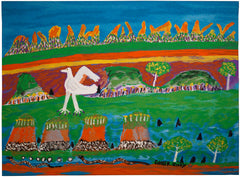
Ginger Riley Munduwalawala received numerous accolades for his contributions to the arts, including being the first Indigenous artist to have a solo exhibition at the National Gallery of Victoria.-
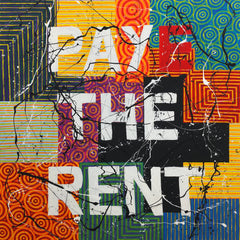
Richard Bell employs satire and political commentary in his art to confront and challenge the viewer, addressing issues of racism, dispossession, and Indigenous rights.
-

Mirdidingkingathi Juwarnda Sally Gabori brought a late-life explosion of colour and abstract beauty to the art world, with paintings that reflect her deep connection to her home on Bentinck Island.
-

Destiny Deacon uses photography and video to explore the lived experience of Aboriginal people, blending humor with poignant commentary on race and identity.
-
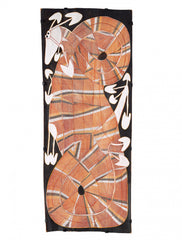
John Mawurndjul is a master of rarrk, a traditional bark painting technique, through which he communicates the sacred stories and sites of his people, blending spiritual and physical landscapes.
-

Tony Albert questions and deconstructs perceptions of Aboriginal identity and history through his mixed-media works, incorporating found objects, historical imagery, and contemporary art practices.
-
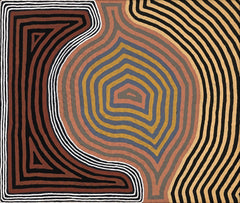
Ronnie Tjampijinpa has a painting style characterised by its striking simplicity and boldness, with large, geometric shapes and a limited colour palette dominating his compositions.
-
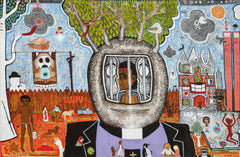
Trevor Nickolls explored the experience of urban Indigenous Australians, merging traditional themes with the challenges of modern life in a style that is both vibrant and deeply reflective.
-
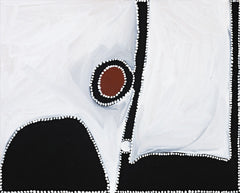
Paddy Bedford's abstract landscapes draw on his Gija heritage, depicting stories and sites of cultural significance with a bold, minimalist aesthetic.
-
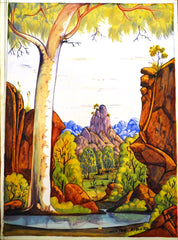
Wenten Rubuntja combined his passion for land rights with his art, creating works that celebrate his deep connection to the Arrernte country and advocate for Indigenous land ownership.
-
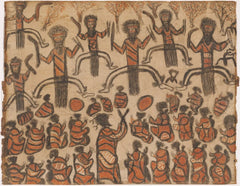
William Barak, as a leader and artist, provided a bridge between worlds, his works offering rare, invaluable insights into pre-colonial Aboriginal life and early encounters with European settlers.
-
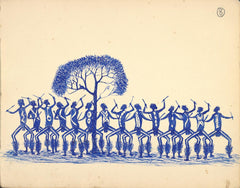
Tommy McRae documented the daily life, ceremonies, and interactions of Indigenous Australians through detailed drawings, offering a unique perspective on the cultural landscape of southeastern Australia during the colonial era.
-
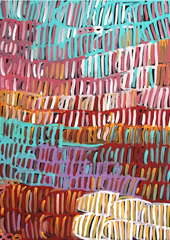
Minnie Pwerle celebrated her Alyawarre heritage through abstract art, with her bold use of colour and pattern reflecting the joy and spirituality of her connection to the land.
-
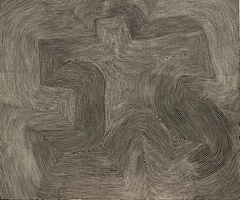
Warlimpirrnga Tjapaltjarri emerged as a leading figure in contemporary Indigenous art, his paintings mesmerising viewers with their complex interplay of dots and lines, representing the ancient stories of the Pintupi.
-
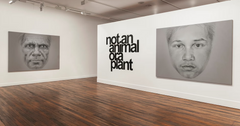
Vernon Ah Kee is known for his multidisciplinary approach, encompassing drawing, video, text, and installation. His work critically examines Australian culture from the perspective of the Aboriginal experience, particularly focusing on race, ideology, and politics.
This curated list of 25 famous Aboriginal artists provides just a glimpse into the vast and varied contributions of Indigenous Australian artists to the global art landscape. Each artist, with their unique approach and perspective, adds to the depth and richness of Aboriginal art. Their work not only serves as a testament to the enduring strength and creativity of Indigenous cultures but also encourages further exploration and appreciation of one of the world's oldest continuous art traditions. As we celebrate these artists, we also acknowledge the many others who continue to enhance our understanding of Aboriginal art, culture, and history.
About Aboriginal Art
Aboriginal Art History Aboriginal Art Symbols What is The Dreaming? Origins of Dot Painting Aboriginal Art RegionsDiscover Aboriginal Artworks
When you buy Aboriginal art from ART ARK®, you support fairness, authenticity, and respect. We work exclusively with community-run, not-for-profit Aboriginal art centres, ensuring every artwork is ethically sourced and culturally significant. Explore our collections and discover beautiful artworks that honour tradition and support artists.
Dot Paintings
From Australia's desert regions, rich with Dreaming stories and iconography.

Arnhem Land Art
Ochre artworks, bark paintings, and sculpture from Arnhem Land.

Watercolour Landscapes
Capturing the Australian landscape in the 'Hermannsburg School' style.

Stretched Desert Paintings
Ready-to-hang desert paintings. Perfect to gift or keep.

Arnhem Land Weaving
Naturally dyed pandanus weavings from Arnhem Land.

Desert Weavings
Aboriginal fibre art by the Tjanpi Desert Weavers using desert grasses.

ART ARK® Subscribers
Extra Aboriginal artworks and interesting emails for our community.

